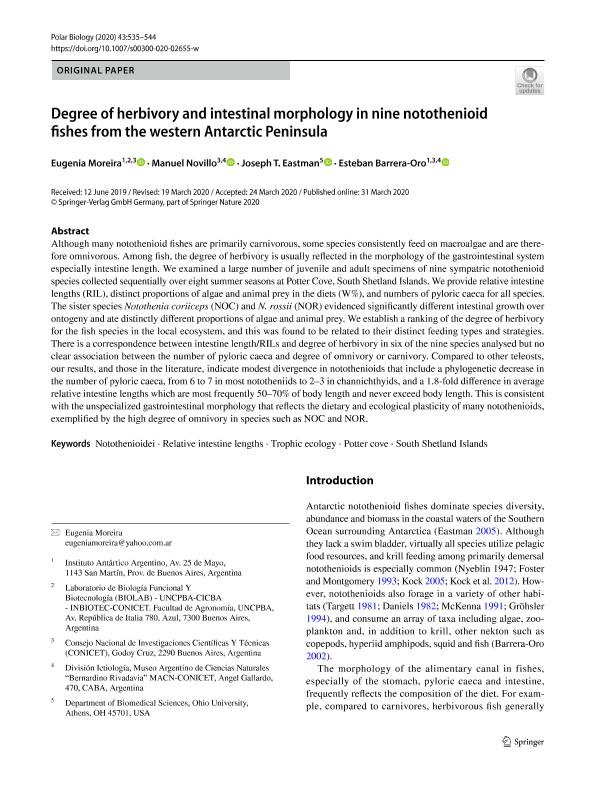Artículo
Degree of herbivory and intestinal morphology in nine notothenioid fishes from the western Antarctic Peninsula
Fecha de publicación:
05/2020
Editorial:
Springer
Revista:
Polar Biology
ISSN:
0722-4060
Idioma:
Inglés
Tipo de recurso:
Artículo publicado
Clasificación temática:
Resumen
Although many notothenioid fishes are primarily carnivorous, some species consistently feed on macroalgae and are therefore omnivorous. Among fish, the degree of herbivory is usually reflected in the morphology of the gastrointestinal system especially intestine length. We examined a large number of juvenile and adult specimens of nine sympatric notothenioid species collected sequentially over eight summer seasons at Potter Cove, South Shetland Islands. We provide relative intestine lengths (RIL), distinct proportions of algae and animal prey in the diets (W%), and numbers of pyloric caeca for all species. The sister species Notothenia coriiceps (NOC) and N. rossii (NOR) evidenced significantly different intestinal growth over ontogeny and ate distinctly different proportions of algae and animal prey. We establish a ranking of the degree of herbivory for the fish species in the local ecosystem, and this was found to be related to their distinct feeding types and strategies. There is a correspondence between intestine length/RILs and degree of herbivory in six of the nine species analysed but no clear association between the number of pyloric caeca and degree of omnivory or carnivory. Compared to other teleosts, our results, and those in the literature, indicate modest divergence in notothenioids that include a phylogenetic decrease in the number of pyloric caeca, from 6 to 7 in most nototheniids to 2–3 in channichthyids, and a 1.8-fold difference in average relative intestine lengths which are most frequently 50–70% of body length and never exceed body length. This is consistent with the unspecialized gastrointestinal morphology that reflects the dietary and ecological plasticity of many notothenioids, exemplified by the high degree of omnivory in species such as NOC and NOR.
Archivos asociados
Licencia
Identificadores
Colecciones
Articulos(MACNBR)
Articulos de MUSEO ARG.DE CS.NAT "BERNARDINO RIVADAVIA"
Articulos de MUSEO ARG.DE CS.NAT "BERNARDINO RIVADAVIA"
Citación
Moreira, María Eugenia; Novillo, Manuel; Eastman, Joseph T.; Barrera Oro, Esteban; Degree of herbivory and intestinal morphology in nine notothenioid fishes from the western Antarctic Peninsula; Springer; Polar Biology; 43; 5; 5-2020; 535-544
Compartir
Altmétricas




